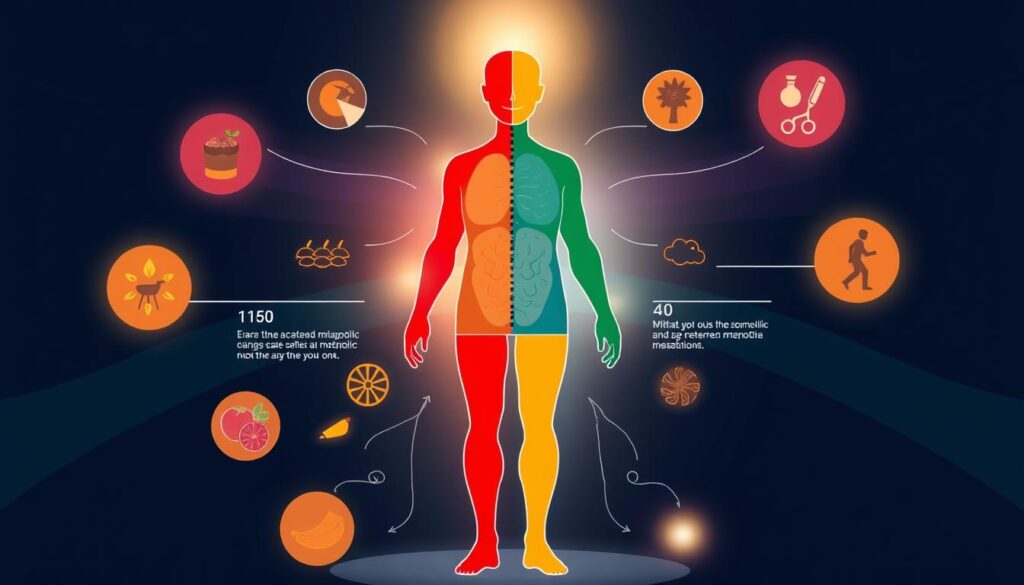Men in their 40s often see changes in their metabolism. This can make it harder to manage weight and feel energetic. The body’s resting metabolic rate drops by about 5% every decade after 40. This means men need to eat fewer calories and make lifestyle changes.
It’s important to understand these changes to keep a metabolic health in check. We’ll look at ways to fight the slowdown in metabolism that comes with age. This includes exercise, diet, and lifestyle changes made just for men over 40.
Understanding Age-Related Metabolic Changes After 40
As we get older, our metabolism slows down naturally. By 30, we might lose 3% to 5% of muscle mass each decade if we’re not active. This starts around 40, making it harder to keep muscle even with exercise.
This loss of muscle can turn into fat, slowing down our metabolism.
Impact of Muscle Mass Loss on Metabolism
Muscle is key to a high metabolic rate. Losing muscle means our metabolic rate drops. Doctors say we need 30 minutes of exercise daily to keep our metabolism healthy.
Strength training can build muscle, helping us burn more calories at rest. This boosts our metabolism.
Hormonal Changes and Their Effects
Hormonal shifts also affect our metabolism as we age. Issues like an underactive thyroid or PCOS can slow metabolism and cause weight gain. These imbalances can lead to health problems as metabolism slows down.
| Metric | Change with Age |
|---|---|
| Body Weight | Increases at an average rate of 0.3 to 0.5 kg per year in men and women between the ages of 40 and 66. |
| Body Fat | Increases by an average of 1% per year in both men and women starting in the fourth decade of life. |
| Resting Energy Expenditure (REE) | Decreases by approximately 4 kcal/y, even after adjusting for body composition. |
| Thermic Effect of Food (TEF) | Reduced by approximately 1% in older persons compared to younger individuals. |

It’s important to understand how metabolic rate, muscle mass, and hormones change with age. This knowledge helps us find ways to boost metabolism and stay healthy in our 40s and beyond.
Essential Exercise Strategies to Boost Metabolism for Men Over 40
As men hit their 40s, keeping a healthy metabolism is more important than ever. Regular exercise helps fight the natural slowdown in metabolism that age brings. By using specific exercise plans, men over 40 can boost their metabolism. This leads to better calorie burning and overall health.
Strength Training for Muscle Building
Building and keeping muscle is key for a faster metabolism. Strength training, like weightlifting or bodyweight exercises, is very effective. Focus on exercises that work many muscles at once, like squats and bench presses. Gradually add more weight to challenge your muscles and help them grow.
High-Intensity Interval Training (HIIT) for Calorie Burn
HIIT workouts, with short intense bursts followed by rest, burn more calories. They raise your heart rate, leading to more calorie burning even after you stop exercising. Add HIIT activities like sprinting to your routine for the best metabolic results.
Combining Strength and Cardio
For the best results, mix strength training with cardio exercises. This combo boosts your fitness and metabolism. Alternate between strength and cardio days, or combine them in one workout for a full-body approach.

By using these key exercise strategies, men over 40 can boost their metabolism. Staying consistent and balanced in your workouts is crucial. This approach helps achieve lasting metabolic benefits and improves your overall health.
Nutrition and Dietary Approaches for Metabolic Health
Keeping a balanced diet is key for men over 40 to stay healthy. Eating more protein helps speed up metabolism. Choose lean proteins like chicken, fish, tofu, beans, and legumes.
Protein Requirements for Aging Men
Men aged 19-30 need 2,000-3,000 calories a day. As they get older, they might need more protein to keep muscles strong. A 2019 study found that a high-protein diet burns more energy than a medium-protein one.
Timing and Frequency of Meals
Eating at regular times helps keep metabolism steady. Foods high in fiber, like fruits and whole grains, aid digestion and keep you full. Don’t skip meals to keep your metabolism healthy.
Hydration and Metabolism Connection
Drinking enough water is crucial for metabolism. Aim for eight 8-ounce glasses a day, more when you’re active. A 2016 study showed drinking 500 mL of water can boost fat burning.
Focus on protein, meal timing, and hydration to boost metabolism. Adding exercise and healthy habits can lead to better health.
Lifestyle Factors Affecting Metabolism After Forty
As we get older, our lifestyle choices are key to keeping our metabolism healthy. Several important factors can greatly affect our metabolic function after 40.
Sleep Quality and Metabolism
It’s vital to get 7-9 hours of sleep each night for hormonal balance and metabolic health. Sleep quality is closely tied to metabolic health. Lack of sleep can disrupt our body’s natural rhythms and lead to weight gain.
Stress Management and Metabolism
Stress management is also crucial for metabolic health. Chronic stress can harm metabolism by releasing cortisol, a hormone linked to weight gain. Activities like meditation, yoga, or deep breathing can help support metabolic function.
Alcohol Consumption and Metabolism
It’s important to limit alcohol consumption as it adds empty calories and can stop the liver from burning fat. It’s recommended for women to have one drink a day and for men to have no more than two. This helps avoid disrupting sleep and metabolic processes.
Meal Timing and Metabolism
Keeping regular meal times and avoiding big calorie cuts can also help prevent metabolic slowdown. Skipping meals or cutting calories too much can put the body in “starvation mode.” This can lower your resting metabolic rate.
By focusing on sleep quality, stress management, moderate alcohol use, and regular meals, men over 40 can support their metabolic health. This helps avoid weight gain.
Conclusion
Improving metabolic health and avoiding unwanted weight gain is key for men in their 40s and beyond. It requires a mix of exercise, nutrition, and lifestyle changes. Strength training, high-intensity workouts, and staying active boost metabolism and keep muscle mass.
A balanced diet is also crucial. It should be rich in protein, fiber, and vitamins to fuel the body. This supports metabolic processes.
Staying hydrated, getting quality sleep, and managing stress are also important. Age-related changes can be managed with consistent, tailored practices. By doing so, men over 40 can improve their metabolic health and avoid weight gain.
Consulting with healthcare professionals is vital for personalized advice. They can help navigate aging changes. With the right mindset and dedication, men can enjoy midlife and beyond with energy and confidence.










